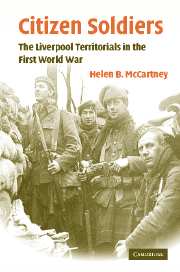Book contents
- Frontmatter
- Contents
- List of figures
- List of maps
- List of tables
- Acknowledgements
- List of abbreviations
- 1 Introduction
- 2 Pre-war Liverpool and the Territorial Force
- Part I Territorial characteristics and the morale of the soldier
- 3 ‘Cuff and collar battalions’: social change and its impact on the unit
- 4 ‘Common ties at home and strong county pride’: the persistence and importance of county uniformity
- 5 The links with home: communication between the home front and the fighting front during the Great War
- Part II Command, discipline and the citizen soldier
- Part III Attitudes and experience: the war and its aftermath
- Bibliography
- Index
- Studies in the Social and Cultural History of Modern Warfare
5 - The links with home: communication between the home front and the fighting front during the Great War
Published online by Cambridge University Press: 25 July 2009
- Frontmatter
- Contents
- List of figures
- List of maps
- List of tables
- Acknowledgements
- List of abbreviations
- 1 Introduction
- 2 Pre-war Liverpool and the Territorial Force
- Part I Territorial characteristics and the morale of the soldier
- 3 ‘Cuff and collar battalions’: social change and its impact on the unit
- 4 ‘Common ties at home and strong county pride’: the persistence and importance of county uniformity
- 5 The links with home: communication between the home front and the fighting front during the Great War
- Part II Command, discipline and the citizen soldier
- Part III Attitudes and experience: the war and its aftermath
- Bibliography
- Index
- Studies in the Social and Cultural History of Modern Warfare
Summary
The traditional view of relations between home and fighting front maintains that the links between soldiers and their communities in Britain were tenuous. Civilians remained largely ignorant of the nature of the war, retaining a glamorized, idealistic impression of the fighting. This view contends that the ignorance of civilians arose as a result of the twin evils of censorship and propaganda. Censorship prevented civilians from comprehending the physical hardships borne by the troops, the mental trauma induced by the experience of battle, and the scale and manner of death during attacks. Propaganda was believed to have inculcated a vicious hatred of the enemy in the civilian population, in opposition to the soldier's supposed brotherly attitude to his opponent, and misrepresented the views of the troops, claiming that they were consistently happy to attack, whatever the conditions. The propagation of these falsehoods, it has been argued, caused soldiers to become disillusioned with those at home, to retreat into their own trench culture and to become alienated from civilian life.
The consensus surrounding this ‘alienation thesis’ is now under attack. A number of historians have asserted that remarkably truthful accounts about the nature of the fighting were transmitted to the home front and that the image of the disenchanted soldier, betrayed by civilian society, is largely a myth. The wartime experience of the Liverpool Territorials, to whom home was all important, supports the revisionist interpretation of wartime relations between soldiers and civilians.
- Type
- Chapter
- Information
- Citizen SoldiersThe Liverpool Territorials in the First World War, pp. 89 - 118Publisher: Cambridge University PressPrint publication year: 2005
- 2
- Cited by

